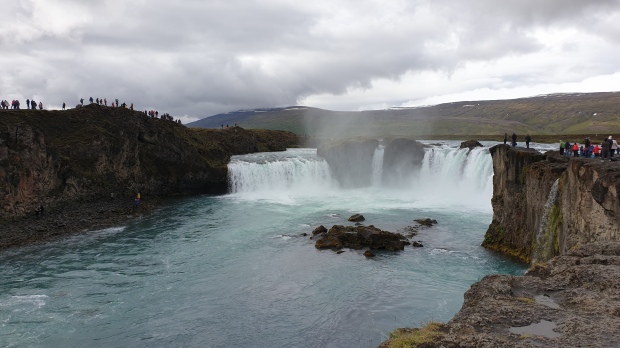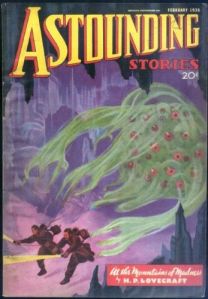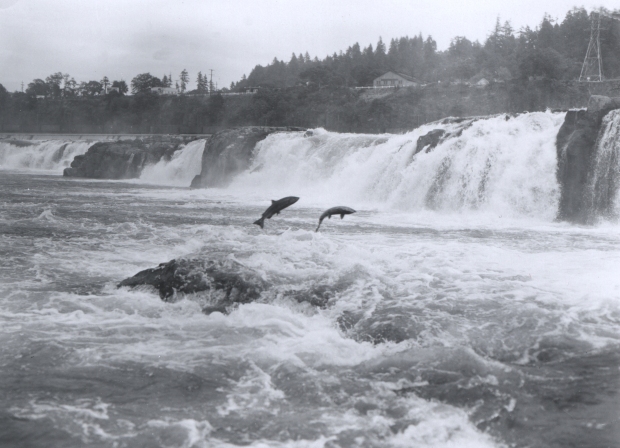I’m no travel writer, I don’t think I could ever be accused of that. I feel that most times, I would inevitably descend into melancholy about the whole affair.
Let’s back up a bit and get some context for this before I descend into the rabbit hole.
I was very lucky this year to be accepted by two writers residencies. The first was in Iceland for a month and the other will be in Wales for around two weeks, with some travel in Dublin and London thrown between and after the residencies.
It’s my last week in Iceland before the UK leg of the trip and I’m currently writing this article sitting in a cafe overlooking the very dramatic Godafoss waterfall about half an hour drive from the northern city of Akyureri.

Godafoss in the distance. (‘Foss’ means waterfall in Icelandic)
The residency itself was an incredible learning experience, and I feel that the mental gymnastics that I experienced during the stay is worth its own post, so I’ll potentially save that for when I have a better perspective on it when I’m back in Melbourne with a flat white as company.
The idea of coming here to finish the novel was in one sense to immerse myself in the landscape of the story and allow that to make the fiction stronger. I wanted to get a sense how individuals engage with an environment like this. As such, much of the time I’ve spent away from the residency has been on long hikes, usually alone, on small dirt tracks leading off into the middle of nowhere, often not seeing another soul for hours.
In the last week, having finished the residency, I decided to take some time to travel around the island and see more of it. I imagine this drastic change, from the solo excursions to visiting the more famous landscapes that make up the must-see locations in Iceland is the reason I’m having this unfortunate reaction.
At almost all the sites I’ve visited, something has been nagging at me. Maybe it’s not the tourist with the drone, shattering the otherwise quiet beauty of a creek. Maybe it’s not the discarded plastic bag along an otherwise untouched lake shore. Or maybe it’s not the guy that is lounging at the very edge of a cliff in a Sleeping Venus pose, almost daring the waterfall to sweep him off while his companion takes his picture.
“The tree which moves some to tears of joy is in the eyes of others only a green thing that stands in the way. Some see nature all ridicule and deformity… and some scarce see nature at all. But to the eyes of the man of imagination, nature is imagination itself.” – William Blake
Standing at the main platform at Godafoss or really at any of the many grandiose sights that Iceland boasts, I always felt so very small, so very powerless in comparison to the sheer power and beauty of my surroundings. Gullfoss leaving you hypnotised even as the spray soaks you. The misty shroud that blankets Gullkistan on a chilly day. The towering tectonic plates of Thingvellir and the winding roads that curve with the land rather than carve through it. Don’t get me wrong, I feel I am very much a tourist, but I feel entirely humbled by the place.
I don’t think it’s simply the acts above that bother me, but what they might represent. Stay with me here, but I wonder if Sleeping Venus dude might be emblematic of a kind of arrogance in the face of nature, the desire to put oneself, superimposed atop it. An ugly demonstration of the perception of humanity’s mastery over nature.
Writing speculative fiction often tends to bring out dramatic statements on the state of mankind, and I generally try to reign it in, but along with our contentious reaction to climate change, I wonder if I’m that far off base. I wonder if we look at our world as more of a selfie filter than a living, breathing place that deserves our respect more than internet brownie points. Yes I realise this makes me sounds like someone who doesn’t understand the internet but surely this belligerence does not bode well?
Is this kind of arrogance new? Probably not. The history of garden design is an easy, if not simplified example, of that relationship through the years. If anything, we’re probably more aware of the problem than ever. But awareness does not necessarily mean that Instagram ‘influencers’ and loud tourists are going anywhere.
I think tourism is a great thing if it’s being used to encourage sustainability and love for our environment but I have a sneaking suspicion that we’ll all be seeing more clones of Sleeping Venus dude.
That’s all for now, and I promise that in the next post I’ll ditch the melancholy and get back to the super positive vibes of the submission process.










